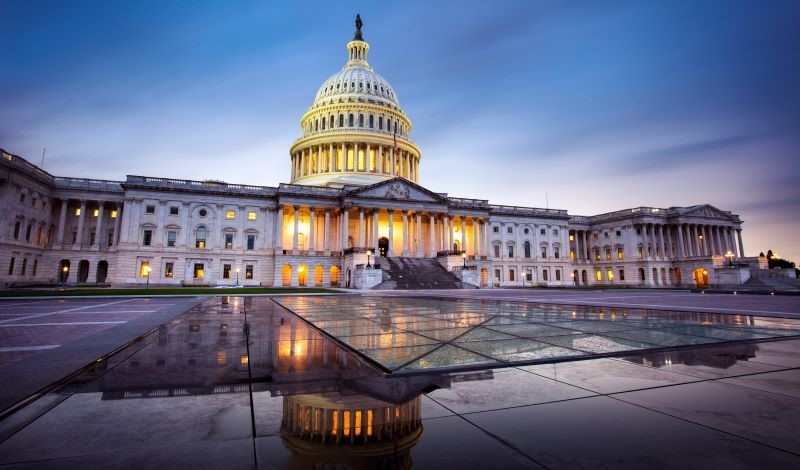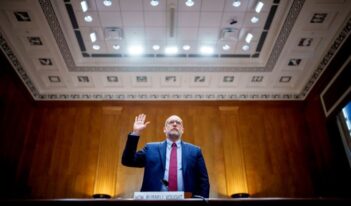
Party-based primaries inhibit the legislative branch.
I am cautiously optimistic that the judicial branch of government will save us from President Donald J. Trump’s assault on our constitutional democracy. President Trump regularly violates numerous statutes as well as the Due Process Clause and the First Amendment of the U.S. Constitution. In most cases, President Trump argues that the Vesting Clause in Article II of the Constitution empowers him to act in ways that violate statutes and even parts of the Bill of Rights.
At present, President Trump and his Administration are the subject of numerous preliminary injunctions that bar them from implementing most of the actions that they have taken. Those injunctions were issued by courts that were chosen by the petitioners because they are dominated by judges who are not sympathetic to President Trump’s agenda. The real test will come when the U.S. Supreme Court acts, or declines to act, in response to the motions to stay the injunctions that the Trump Administration has filed and will continue to file on the Supreme Court’s emergency docket.
I am not willing to predict the results in each case, but I am cautiously optimistic that the Supreme Court will create meaningful boundaries on presidential power. If the Vesting Clause empowers President Trump to take all of the actions that he claims it allows, it would render the other more specific clauses in Article II unnecessary and make the rest of the Constitution irrelevant. I am also cautiously optimistic that President Trump will comply with the decisions of the courts. President Trump has said that that he will, and I take him at his word.
If my optimistic beliefs prove to be accurate, we will have avoided a constitutional crisis and demonstrated that our government has at least two branches: the executive and the judicial branch. I remain concerned, however, that we no longer have an effective third branch of government. Over the last 30 years, the legislative branch has lost its ability to legislate.
For most of the nation’s history, the executive branch and the legislative branch worked together to devise bipartisan statutory compromises that addressed the host of problems that confronted the nation. When a problem arose, the White House usually convened a meeting with the leaders of both parties in both chambers of the U.S. Congress to address the problem. The U.S. House of Representatives and the U.S. Senate would then act—initially in committees, then in floor votes, and eventually through a conference committee that resolved differences between the House and Senate versions of a proposed bill.
The members would discuss the problem, draft a bill that reflected the results of the discussion, and enact a statute that addressed the problem. The resulting legislation usually was enacted by a large, bipartisan majority of the House and Senate. For instance, the Clean Air Act was passed unanimously by both chambers of the Congress during the Nixon Administration.
That cannot happen today. The most that any newly elected President can expect to accomplish in Congress is the enactment of limited-duration legislation that qualifies as an exercise of the powers to tax, appropriate, or spend. Legislation of that type can be enacted by a straight party-line vote during the first two years of an administration. After that period, the President is virtually certain to lose control of the House and, as a result, all power to enact legislation.
Former Supreme Court Justice Stephen Breyer has described the way that he and U.S. Senator Edward M. Kennedy (D-Mass.) were able to draft legislation that was enacted by a bipartisan majority when Senator Kennedy was chair of the U.S. Senate Judiciary Committee and Justice Breyer was the Committee’s chief counsel. They knew that they had to compromise with people such as Senator Strom Thurmond (R-S.C.)—a staunch opponent of racial desegregation—to get any legislation enacted.
The starting point in the process was to meet with the Senator who was most likely to oppose the legislative initiative that Senator Kennedy supported. At the meeting, Senator Kennedy and Justice Breyer would ask the Senator questions and listen carefully to the answers. As soon as the Senator said something that they agreed with, Senator Kennedy and Justice Breyer would express agreement. That was the beginning of the process of negotiating a compromise. If the compromise contained at least 30 percent of the results that they sought, Senator Kennedy and Justice Breyer considered the negotiation a success and supported the resulting bill.
That process cannot take place today. Any member of the House or Senate who participates in such a process is likely to be “primaried” out of office. Most members of the House and Senate represent “safe” districts or states. They are safe in the sense that the member’s party is virtually certain to win in the general election, but they are not safe for the member. Most members are vulnerable to losing in a party-based primary. If members compromise, they almost certainly will be primaried.
Party-based primaries are low turnout elections in which the most extreme members of each party participate in disproportionate numbers. The only safe strategy for any Democratic member is to go far left and stay there. Similarly, the only safe strategy for any Republican member is to go far right and stay there. Any member of either party who compromises with members of the other party is virtually certain to be primaried.
Many of the patterns of behavior of politicians today can only be explained by fear of being primaried. For example, President Trump regularly violates the Impoundment Control Act of 1974, which requires the President to spend all money that has been appropriated by Congress for the purpose for which it was appropriated.
The Republican-controlled House and Senate have not objected to the President’s flagrant violation of a statute that empowers the legislature to limit the President’s discretion to act in ways that defy the will of Congress. There is only one plausible explanation why: All Republican members of Congress know that they will be the victim of a successful primary campaign—supported by President Trump—if they object to his violations of the Impoundment Act.
As another example, President Joseph R. Biden unilaterally created new agencies to regulate companies that produce artificial intelligence, companies that hold the personal information of U.S. citizens, and companies that produce energy-efficient equipment and technology. In the past, a President who wanted to create a new agency to perform a new mission would go to Congress to negotiate and draft a compromise bill that would empower the agency to perform the task. Congress would then enact the statute with strong bipartisan support. Like all modern Presidents, President Biden knew that no effort of that type could succeed. No member of Congress can engage in the process of negotiating a compromise without being primaried.
The most recent illustration of the risk of being primaried out of office resulted from U.S. Senator Chuck Schumer’s (D-N.Y.) recent decision to keep the government from shutting down by voting for the continuing budget reconciliation that had been enacted by the House Republicans on a straight party-line vote. His support helped to inspire U.S. Representative Alexandria Ocasio-Cortez (D-N.Y.) and U.S. Senator Bernie Sanders (I-Vt.) to organize a series of speeches around the country to provide much-needed energy to the Democrats’ opposition to the actions of the Trump Administration.
Representative Ocasio-Cortez obtained her position by successfully primarying a moderate Democrat who had long held the seat she now occupies. Many Democrats are now urging her to primary Senator Schumer out of office. I hope that she resists those entreaties. Party-based primaries are inconsistent with any attempt to recreate an effective legislative branch of government. They make it impossible for politicians to engage in the compromise negotiations that are an indispensable part of the legislative process.
If we are not able to replace party-based primaries with open primaries, we have no chance of recreating an effective legislative branch of government. We are unlikely to survive as a constitutional democracy without an effective legislative branch even if we are successful in protecting our constitutional democracy from President Trump.




